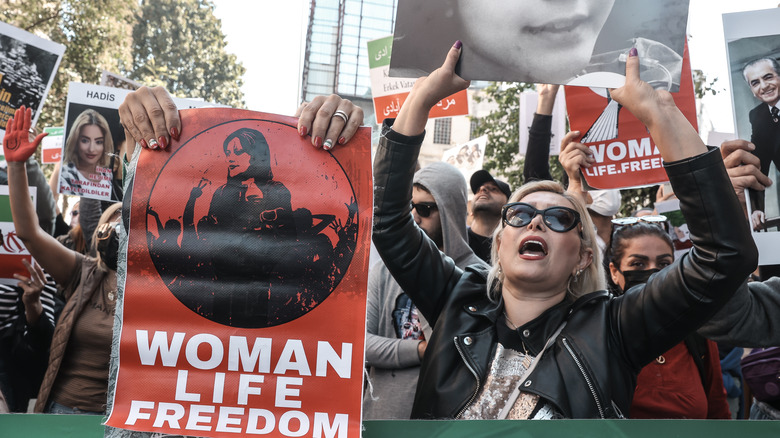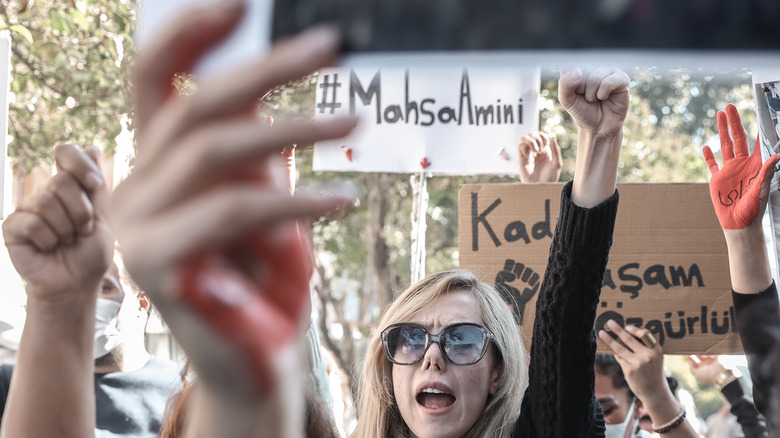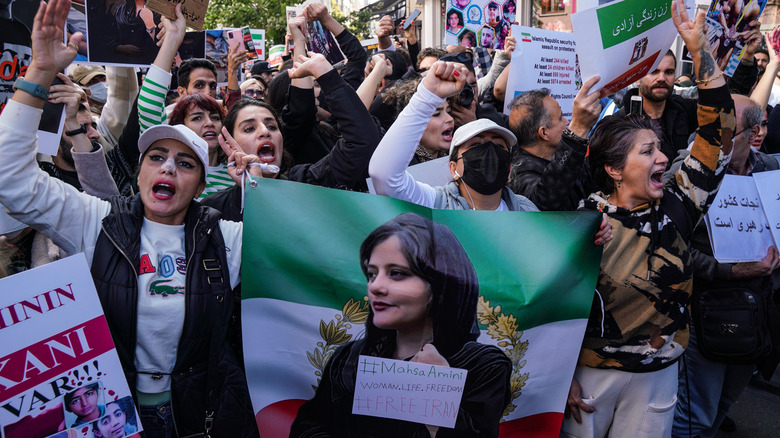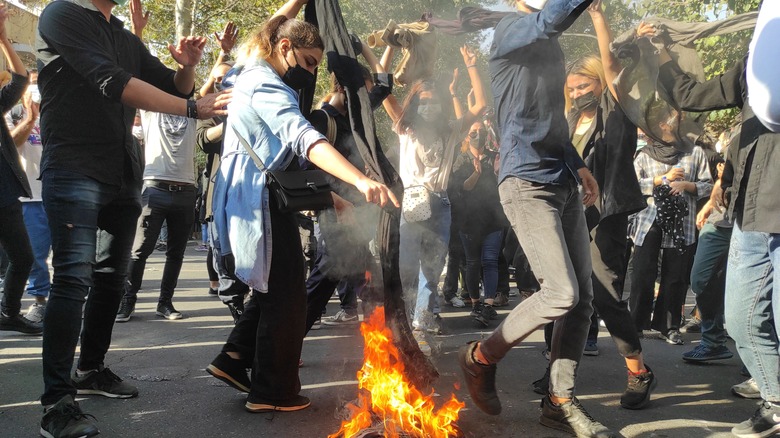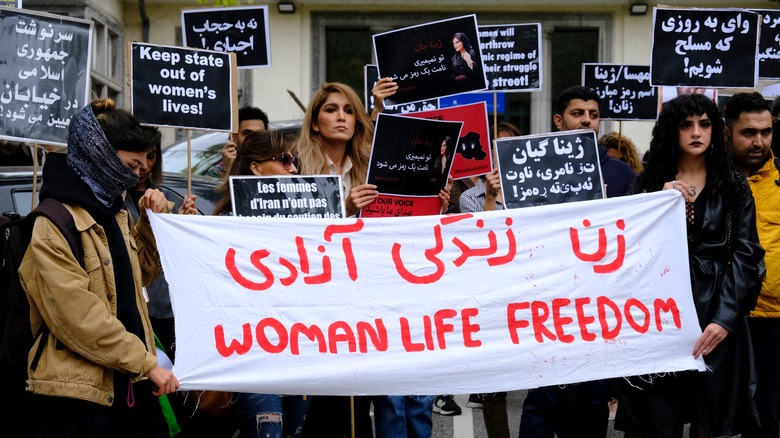Meet Elnaz Rekabi, The Iranian Athlete Who Controversially Competed Without Her Hijab
In the weeks of women-led protests that have broken out in Iran after the death of Mahsa Amini, a new report by Amnesty International claims at least 23 children have been killed by security forces (via CNN). So when footage emerged of Iranian champion climber Elnaz Rekabi competing without wearing a headscarf and quickly went viral, then she suddenly disappeared, people understandably got worried (via Newsweek).
Wearing a hijab correctly can be a matter of life and death in Iran. For 22-year-old Amini, the fact hers wasn't being worn correctly was enough of a reason for Iran's "morality police" to arrest Amini on September 13, 2022 (via The Cut). Three days later, the state claimed Amini had died in custody following a medical emergency. The Los Angeles Times reports Iran has made every attempt to get the country under control ever since.
From blocking social media and internet usage to making arrests, which are already reported to number in the thousands, Iran is cracking down hard on any dissonance. When Rekabi competed in the finals of a climbing competition in Seoul, South Korea, without a hijab, The Washington Post explained many interpreted it as a bold political statement. As the Financial Times confirmed, no Iranian woman who has competed without wearing a hijab has returned to the country safely.
Rekabi suddenly became like Katniss from "The Hunger Games," her lack of hijab the equivalent of Katniss' three-finger salute and "Mockingjay Call."
What Iran claims happened to Elnaz Rekabi
In a 2016 interview with Euronews, Elnaz Rekabi acknowledged how "bizarre" it was to be the only woman at a competition wearing a hijab while also keeping her legs and arms covered, especially in hot conditions. But, according to The Washington Post, despite the difficulties of operating within Iran's strict dress code for women, Rekabi had always worn her hijab before — until the final round of the IFSC Asian Championships, that is.
Officially, Rekabi's lack of hijab was an accident, not an act of protest. According to BBC World News, Rekabi explained on Instagram: "Due to bad timing, and the unanticipated call for me to climb the wall, my head covering inadvertently came off." Per CNN, Rekabi also shared that she was "endlessly grateful for the support of you, all the people of Iran, the most decent people of the planet, athletes, and non-athletes, and all of your support in [the] international community."
Rekahbi's explanation for her lack of hijab was echoed in an interview with the Iranian state news agency IRNA when she returned to Tehran. The video shows her looking nervous and dressed, again, not in a hijab, but instead with a baseball cap over a sweatshirt hood to cover her hair (via The Washington Post). "I have returned to Iran in good health and safe," she added in the IRNA interview, apologizing again "to the Iranian people for the confusion and concerns."
Elnaz Rekabi was reportedly forced to apologize
The problem with Elnaz Rekabi's explanation and alleged apology for not wearing a hijab while competing is that Iran may have forced her hand. According to The Guardian, there is a long history of human rights groups accusing Iran of forcing people to make public apologies on state television and social media.
The Independent Center for Human Rights in Iran wrote on Twitter: "Don't take the government in Iran's word at face value — it has a documented history of detaining, maiming and killing those who oppose it." One source told BBC Persian this is exactly the case with Rekabi, revealing the climber was detained at the National Olympics Academy upon returning to Iran last week.
For international human rights lawyer Gissou Nia, it could not be clearer that Rekabi was forced to make the apology. Speaking to DW News, Nia argued any reassurances Iran gives about Rekabi's safety can't be trusted, given the country's history. She also speculated that the outpouring of public support — the large crowds at the airport in Tehran when Rekabi returned home from South Korea, for instance — may have factored into authorities' decision not to make a public arrest.
In fact, the viral attention Rekabi has received could be what's keeping her alive. "A lot of individuals are tortured, arrested, killed under secrecy and the cover of silence and no one knows their names," she said, adding that it's important for the international community to keep elevating Rekabi's story.
Iran has a history of forced confessions
For British-Iranian actor Nazanin Boniadi, watching Elnaz Rekabi apologizing was like revisiting the confessions of countless other women who came before her. Boniadi told BBC World News that all she "could think of was the hundreds and hundreds of false confessions that we are accustomed to seeing out of Iran." She admitted that "confessions under duress" are all too common in her home country.
Boniadi's claims aren't anecdotal either. After combing through "more than 1,500 hours of over 150 programs and 13 in-depth interviews with victims," the International Federation for Human Rights discovered that "the use of forced confessions broadcast by state-owned media has been systematically used by the Iranian authorities to repress dissent for decades."
The investigation also found that victims — ranging from journalists to activists and even human rights defenders — often had long-term side effects from the mental and psychological torture endured while being put through a coercion program. Recently, writer Sepideh Rashno's confession went viral after she was arrested in July of this year.
After going missing for weeks when a video of her defying hijab laws went viral, Radio Free Europe reports Rashno appeared on state television looking pale and seemingly reading a pre-written apology. Atena Daemi, a human rights defender, compared the apology to that of the 25 Kurdish prisoners who were forced to confess to being ISIS members.
Elnaz Rekabi reportedly went missing after competing without a hijab
Fears for Elnaz Rekabi's safety started building when she disappeared after the IFSC Asian Championships. According to the Financial Times, Rekabi's friends and family were unable to contact her for 48 hours before Rekabi finally arrived in Tehran. Despite coming home to a "hero's welcome," sources clarified that Rekabi has been treated like anything but by the Iranian government.
In an exclusive report by IranWire, it was revealed that Rekabi will ultimately end up in Evin prison for the crime of competing without a hijab. The report alleges Rekabi was taken to the Iranian embassy in Seoul, South Korea, following her competition, in an effort to block any attempts at seeking asylum there. To get home safely, a source argued, all Rekabi had to do was hand over her passport and cell phone and she'd be guaranteed safe passage.
BBC World News adds that Rekabi was also allegedly coerced into writing a check for $35,000 and to giving Iran's Mountaineering Federation full power of attorney over her family's estate. The Embassy of the Islamic Republic of Iran in South Korea tweeted out a statement strongly denying "all the fake, false news and disinformation" regarding Rekabi's case.
According to CNN, she's currently under house arrest. However, the head of the Iranian federation of mountaineering and sport climbing claimed Rekabi is "with her family." There's no independently-confirmed information about her whereabouts so, sadly, it's anyone's guess.
